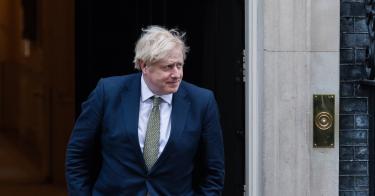This Friday, the United Kingdom will be extricated from the European Union. Yet even as Brexit holds the promise of bringing the U.S. and the newly liberated U.K. closer together, another challenge could push them further apart.
Whitehall punted this week on a momentous decision over whether to exclude Huawei, the Chinese telecom giant, from the build-out of the U.K.’s 5G telecom network.
The government announced it would not ban Huawei technology and equipment from the system, but it would keep the company out of the most sensitive parts of the network. It will present guidelines for managing this process to Parliament, where backbenchers could well work to amend or outright kill the proposal.
Allowing even the nose of Huawei under the tent of U.K. 5G would be a big mistake. And this lamentable decision comes at a time when Britain can least afford missteps in the nascent post-Brexit era.
Some in the halls of British power salivate over the prospect of bringing in Huawei to help create the country’s high-speed cyber network at low, low cost. As for concerns that this might wind up giving China access to all data on the network… well, the pro-Huawei crowd now promises that it will mitigate those concerns by limiting the company’s involvement to just parts of the network.
But a national telecom structure that incorporates Huawei technology—and virtually all national infrastructure connected to it—is guaranteed to be compromised. Even if data is protected in the U.K., it is not protected in China. By Chinese law, anything a Chinese company has access to, the government, by law, has access to as well.
There is no question that Huawei answers to the Chinese Communist Party. Ultimately it is just another instrument of the party, no different from the military or the government. Security experts around the world have warned of the potential security risks of giving a foreign power potentially full access to the systems that run the country and data concerning every citizen.
The concern is more than theoretical. The Chinese Communist Party’s track record is appalling. It already uses its massive investments in technology to spy on, monitor and control its own people. In particular, the government has weaponized Artificial Intelligence to oppress two million of its Uighur citizens.
In the U.S, the Chinese Party has directed theft of intellectual property from private sector companies, perpetrated massive data breaches on government and commercial systems and spied on everyday Americans.
Why would any Western nation take the risk of building a 5G network on the back of such an utterly untrustworthy power? It would be like hiring John Dillinger to work in a bank, but saying “Don’t worry; we’ll tell him he can only rob other people’s ATMs.”
It’s no wonder, then, that nation after nation in the free world has rejected the idea of contracting with Huawei to develop their 5G networks. Central Europe, for example, has pulled the welcome mat out from under the company.
Rolling the mat out for China is the wrong call for the U.K., and it is exactly the wrong time for the U.K. to make it.
The U.S. has signaled every intent to negotiate a free trade agreement with the U.K. It would give a shot of adrenaline to both economies. Why mess that up by putting the British economy at risk to manipulation and exploitation by China?
Then there are the national security concerns. Compromising British telecom systems could fundamentally weaken the long-standing “special relationship” between our two countries. That relationship has allowed us to share freely even the very most sensitive intelligence. That would no longer be possible if the Brits were to adopt a communications system that gives Beijing access to everything in the pipeline.
Secure intelligence sharing isn’t just nice to have. From the 1940s to the present, it has repeatedly been the difference between life and death. In 1983, for example, Britain helped avert a nuclear crisis by sharing information from the most classified sources on the planet—a British double agent working in the Kremlin during the height of the Cold War.
The Anglo-American partnership is too important, too critical to the well-being of both nations, to be put at risk. A wrong-headed 5G decision today will hinder or even block our ability to share strategic intelligence in the future.
Perhaps most important, it makes no sense for Britain to take back its sovereignty from the European Union today, to compromise it to the Chinese tomorrow.
Boris Johnson’s decision to seal the deal on Brexit was truly momentous. His decision on whether to include Huawei in the U.K.’s 5G plans, if the government follows through, will be disastrous.
This piece originally appeared in Fox News




